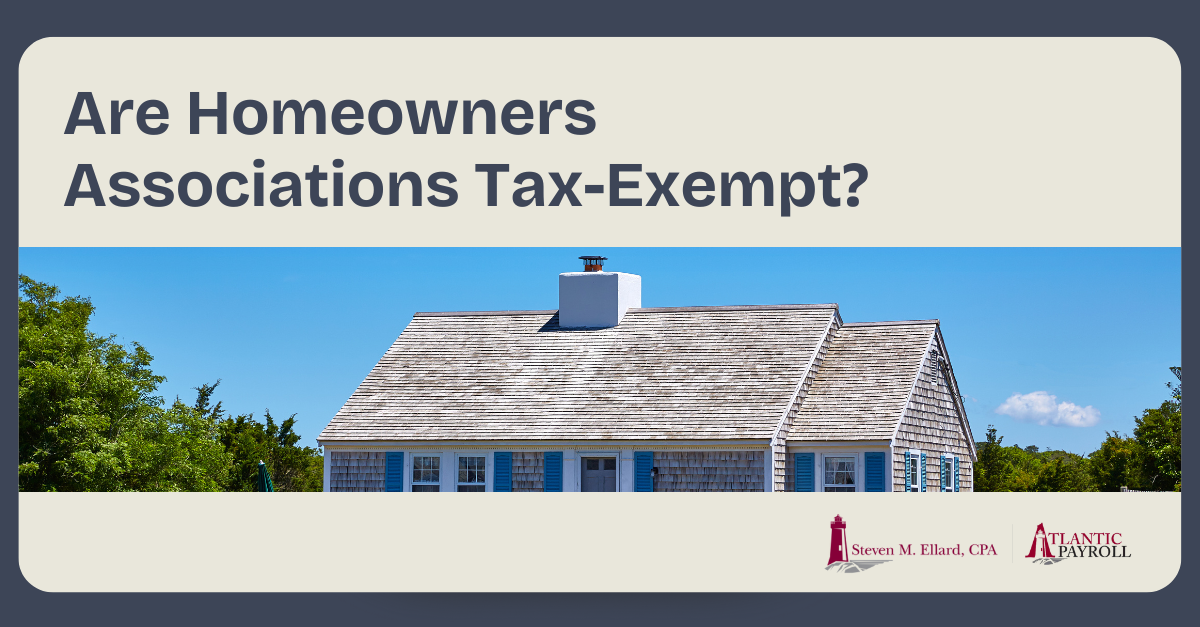(And What That Actually Means for Your HOA)
If you’re on your HOA board (or thinking about joining), you’ve probably heard the term “tax-exempt” thrown around.
Maybe someone said, “Oh, don’t worry, we’re a nonprofit – we don’t have to pay taxes.”
But are homeowners associations tax-exempt?
In this article, we’ll walk through exactly how Homeowners Associations Tax-Exempt status works, what it takes to qualify for tax exemption, and what your board needs to be doing each year to stay compliant and avoid headaches.
Let’s start with the basics.
Step 1: Is Your HOA a Nonprofit?
Most HOAs are set up as nonprofits at the state level, which is a key part of achieving Homeowners Associations Tax-Exempt status. That just means you aren’t in it to make money; you’re simply collecting dues from homeowners to pay for things like landscaping, snow removal, pool maintenance, and so on.
✅ Being a nonprofit in your state helps you legally operate as an HOA.
BUT…
🚫 Being a nonprofit in your state does NOT automatically mean you’re tax-exempt in the eyes of the IRS.
Learn the steps to streamline your finances in our guide, Year End Payroll Process.
Step 2: Understanding the Different Types of “Tax Exemption”
Here’s where it gets a little tricky.
There are a few different ways an HOA might avoid federal income tax, each affecting how Homeowners Associations Tax-Exempt status is obtained. However, they each come with different rules, paperwork, and strings attached.
Here are the main options:
- Filing under IRS Code Section 528
- Becoming a 501(c)(4) tax-exempt organization
Let’s tackle them one at a time.
Option 1: The easiest route – IRS Section 528 (and Form 1120-H)
This is the route most HOAs take.
It works like this:
- You still file taxes every year (using a form called 1120-H).
- You don’t pay taxes on most of your income (the dues and fees homeowners pay).
- You do pay taxes on any money you make from non-members, like if you rent out the clubhouse for a wedding, or earn interest on a big reserve fund.
The IRS says: “Hey, as long as you spend most of your money on taking care of the property, we’ll let most of your income go untaxed.”
To qualify, your HOA has to:
- Use at least 90% of what you spend on running and maintaining the neighborhood
- Get at least 60% of your income from HOA dues
- Be set up to maintain things like the grounds, common areas, etc.
✅ This is usually the simplest option.
📄 But you still need to file that 1120-H form every year.
Option 2: The harder route – Becoming a 501(c)(4)
This is what some people think of when they hear “tax-exempt.”
But for HOAs, it’s harder to get.
To be approved as a 501(c)(4), your HOA has to show it’s doing things that benefit the whole public, not just the people who live in your neighborhood.
For Example: If your HOA maintains a public park that everyone can use—not just residents—that might qualify. But most HOAs don’t meet that bar.
So while it’s technically possible, it’s usually not worth the hassle.
Step 3: What Happens If You Do Nothing?
Even if you’re small, volunteer-run, and just trying to keep the grass cut, you’re still a legal entity collecting money.
And that means the IRS expects you to file a tax return every year.
If you don’t?
- The IRS won’t assume you’re tax-exempt.
- They’ll treat your HOA like a regular corporation.
- That means you could be taxed on everything—even the dues and assessments from homeowners.
Worse, you’ll have to file Form 1120, which is much more complex. You might end up paying taxes you didn’t need to, and possibly face penalties for doing it wrong or late.
So if your HOA has never filed before, or you’re not sure what forms have been used in the past, this is a good time to check in and clean things up before it snowballs.
So… What Should Your HOA Actually Do?
The good news is that most HOAs qualify for a pretty simple tax path.
You should:
- Elect to be taxed under IRS Section 528
- File Form 1120-H each year
- Keep your records clean and organized
- And make sure someone who understands HOA taxes is double-checking everything
This setup protects your association from being taxed on your core income (dues, fees, assessments) and helps maintain Homeowners Associations Tax-Exempt status, keeping your filing straightforward.
But even under Section 528, some things are taxable, like interest income or clubhouse rentals. So having someone in your corner who knows the rules can make a big difference.
Who Handles All This Stuff?
Let’s be honest… most HOA boards are made up of volunteers just trying to keep things running smoothly.
Nobody joined the board because they were excited to deal with the IRS.
That’s where we come in.
At Steven M. Ellard, CPA, we help HOAs like yours handle all the behind-the-scenes financial work, including:
- Filing your annual tax return (yes, we handle Form 1120-H)
- Making sure you qualify for Section 528 each year
- Keeping your books organized and audit-ready
- Figuring out what income is taxable (like clubhouse rentals or investment interest)
- Catching up on prior-year filings if you’re behind
We know the tax rules. We know the paperwork. And we know how to keep things clean and simple so your board can get back to managing the community, not trying to translate IRS code.
A Few Common Questions HOA Board Members Ask Us
“We’re just a volunteer board—do we really need a CPA?”
Yes. Even small HOAs need to file tax returns correctly. And most boards don’t want to risk IRS penalties or unexpected tax bills. A CPA (like us) makes sure you’re filing under the right rules, taking advantage of the right exemptions, and staying compliant.
“What happens if we start making other income?”
Let’s say your HOA rents out the clubhouse or gets interest from a large reserve account. That income might be taxable, even under Section 528, so it’s important for Homeowners Associations Tax-Exempt organizations to calculate what portion is taxable and how to report it properly..
“We’ve never filed anything—are we in trouble?”
Maybe, maybe not. The best move is to get caught up ASAP. The longer you wait, the harder (and more expensive) it becomes. We can help you figure out what’s missing and fix it.
“Can’t our treasurer just do this?”
If your treasurer is also a CPA who knows HOA tax rules—yes. But most aren’t. And let’s be honest: for Homeowners Associations Tax-Exempt boards, hiring a professional means fewer mistakes and less stress, since board members are volunteers with busy lives.
Ready to Make Sure Your HOA Is Set Up Right?
Whether your HOA is brand new or just needs help untangling a few things, we’re here to help.
Get in touch with our experienced team at Steven M. Ellard, CPA to schedule a quick call.
We’ll take care of the IRS forms, compliance, and all the behind-the-scenes stuff—so your board can get back to making the neighborhood a better place to live.







